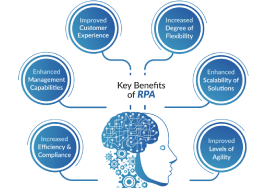The technology industry has no shortage of acronyms in its lexicon. Today we take a look at two key terms—business process automation (BPA) and robotic process automation (RPA) to determine what these technologies and strategies offer, how they’re similar, how they’re different, and how businesses can leverage them for process automation, and ultimately digital transformation. First, let’s look at what these terms mean.
What is robotic process automation (RPA)?
RPA is technology that performs automated predefined business tasks. The technology is deployed as software programs, sometimes called “bots,” that function as a digital workforce built to supplement and support human teams.
What is business process automation (BPA)?
BPA is not a technology, although there are technologies focused on providing BPA-related services. BPA can be thought of as a strategy or approach for using technology to automate previously manual workflows. It considers the process as a whole, and leverages technology to inject efficiencies where possible.
Is BPA or RPA better for my business?

BPA places emphasis on technology systems, helping businesses identify which processes are best fit for automation with technology, and leveraging that technology to build the most efficient workflows possible. While BPA can leverage RPA to improve single processes and individual tasks, its efficacy and ROI grow when it is implemented as part of a larger overarching strategy for digital transformation.
Benefits of BPA
BPA takes an end-to-end view of a business process. Its ultimate goal is to uncover efficiencies in every nook and cranny of a given automated process. To this end, the primary benefit BPA delivers is ongoing improvements, giving businesses the opportunity to use technology to continually make the business better.
Benefits of RPA

Still for all its benefits and demonstrable ROI, it’s important to understand that RPA should be viewed as a tool in the toolbox—not a singular savior for digital transformation. True digital transformation comes from a broader, enterprise-wide strategy where all components of a business’s processes and technology stack are considered for optimization. Which brings us to business process management, another important concept to understand: business process management (BPM).
Complete Business Process Management (BPM)
It’s important not to confuse BPA with a similar but different term, business process management, or BPM. While BPA focuses on optimizing technologies for automated workflows, BPM is the strategy of managing both manual and automated processes.
RPA vs. BPA vs. BPM
To put it all a little more simply:
- RPA is a technology for automating tasks.
- BPA is a strategy that focuses on using technology to create efficient automated processes.
- BPM is a strategy that considers the efficiencies of end-to-end processes, inclusive of both automated
processes and human-led manual processes.
Tips for How to Automate Business Processes
Whether you’ve already started with RPA, or you’re looking to build a process automation roadmap, having the right partners by your side can make all the difference. Work with teams who can guide your decision making, and whose products feature grow-with-you tools that are designed to integrate with others. Have questions? We have answers, and a team of experts ready to help. Schedule a free consultation or demo of our intelligent automation platform today.

